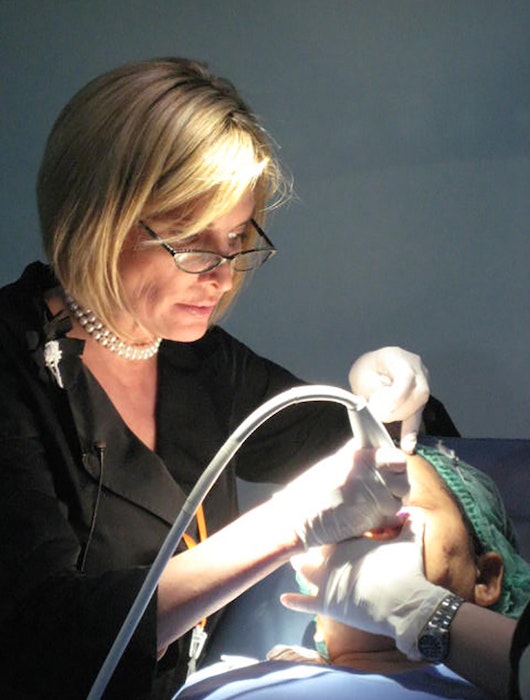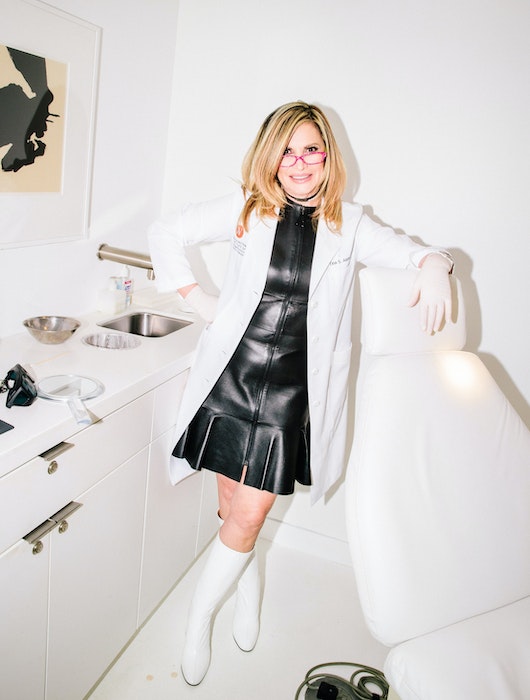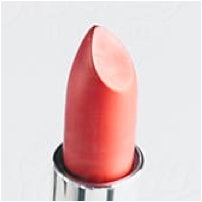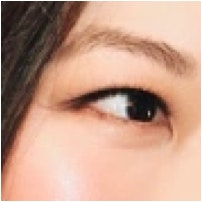Meet Laser Queen Dr. Tina Alster: The DC Derm Who Injects Your Favorite Politicians
[email protected] | July 28, 23

Tina Alster, MD, is so passionate about laser dermatology, she could probably write another book about it.
In fact, to date, Dr. Alster has written eight textbooks (and published hundreds of articles) on the subject. The board-certified dermatologist founded the Washington Institute of Dermatologic Laser Surgery® in Washington, D.C. in 1990, where there are currently over 30 lasers and other devices on site.
Interestingly enough, the popular D.C. doctor almost wasn’t a doctor at all. Dr. Alster, who is also a clinical professor of dermatology at Georgetown University® Medical Center and an award-winning doctor, first studied to be a nurse. “I must have the only parents who thought that their child shouldn’t be a physician,” she says.
Despite her father’s concerns (more on this later), she graduated college and medical school from Duke University®. Next, the Washington, DC native enrolled in and completed her dermatology residency at Yale® University. And, finally, she interned at the Hospital of the University of Pennsylvania®, focusing on internal medicine.
These days, Dr. Alster spends her days treating patients from all walks of life (when she isn’t at Zumba® class or traveling the world for fun). Some of her patients have become her close friends, some are political figureheads. Although she didn’t meet her husband at the office, he eventually became her patient, too. Read on to find out what treatments her clients request the most, how politics impact medical aesthetics, and why her son will absolutely not follow in her footsteps.
Spotlyte: Did you always want to become a dermatologist, or is that something that came later in life?
Dr. Tina Alster: I did not always want to be a dermatologist, but I always wanted to be a physician. Nobody in my family is a physician, so I was the odd duck. Even at an early stage — say, when my younger sister fell out of a tree when I was nine years old — I was the one that was calling the ambulance and making sure everybody was okay.
Spotlyte: Your dad wanted you to be a nurse, rather than a doctor.
TA: He said that he would support my education — if I became a nurse. He thought that I’d be a chemistry major, then change my mind about becoming a doctor, and I wouldn’t be able to get a job as a chemistry major. So, I actually went to Duke and received my BS degree in nursing, but at the same time pursued all my pre-medical requirements.
Spotlyte: Once you were admitted to medical school, you pursued a variety of concentrations. How did dermatology come into play?
TA: I ended up becoming an assistant head nurse in the open-heart intensive care unit, because at that time I thought I was going to be a pediatric cardiothoracic surgeon. By the time I got through my second year of medical school, I decided I would be a pediatric urologist instead, and I conducted urology research during my third year.
After all that, I was introduced to dermatology. I did a rotation [and] said, “Oh my gosh, this is nirvana!,” because you have both surgery and medicine, and you have decent hours. [Editor’s note: Dr. Alster is a dermatological surgeon.] And all the dermatologists were really nice, balanced, and smart.

Spotlyte: What are the most common questions people ask you when they come to the office?
TA: Because I’m an aging baby boomer myself, I tend to attract people who are aging baby boomers. People start noticing more lines, wrinkles, and sagging. But the biggest question people have outside of what I recommend for them is, “What do you have done?”
I obviously see patients from both sides of the political aisle. Not many people will tell you that I’m their dermatologist. But everybody in DC knows who I am.
Spotlyte: How do you approach people who want to try treatments for the first time?
TA: I always start off with giving people permission to have treatments by saying, “Look, I’ve done a lot of the procedures that I’m telling you to do. I’ve already been through this, but I’m about 30 years ahead of you (in the treatment department).”
Spotlyte: Do people in Washington, DC openly talk about treatments they get done?
TA: They don’t wave around the fact that they do a lot of treatments. That’s not to say that they don’t tell people, but they don’t volunteer it. And a lot of people would downplay the fact that they have procedures performed. It’s still very hush-hush. It’s not like LA, New York, or Miami, where people flaunt what they have done.
Spotlyte: Does age influence how open people are about discussing treatments?
TA: The younger generation is different. They always say, “Oh yeah, I got injectable wrinkle reducer or I got lip injections.” For older people, who really need it, they never admit to doing these things.
Editor’s Note
Injectable wrinkle reducers temporarily smooth the look of moderate to severe wrinkles in certain areas of the face, including the forehead, frown lines, and crow’s feet; they should not be used more frequently than every three months. Injectable filler is a temporary treatment that adds volume to areas of the face such as the lips, cheeks, and laugh lines. Like any medical treatment, both injectable wrinkle reducers and injectable fillers have potential risks and side effects. Talk to a licensed provider to see if they’re right for you. And learn more now by chatting with a trained aesthetic specialist.
Spotlyte: How do politics and dermatology intertwine?
TA: I obviously see patients from both sides of the political aisle. Not many people will tell you that I’m their dermatologist. But everybody in DC knows who I am. I see virtually everybody of importance. The Secret Service has known me for decades. Apparently, I have very high security clearance.
Spotlyte: Do politicians often conceal their treatments to the public?
TA: They’ll tell you that they see me as a patient, but they won’t say, “Oh yeah, I’ve had injectable wrinkle reducers or fillers or any other [aesthetic] treatment.” They’ll say, “I’ve had my rosacea [treated].” Or, “Oh, yeah, I had a little skin cancer or a mole removed.” They get away with it because they’re not lying: Of course I do those treatments for them, but I also perform other [aesthetic] procedures on them as well.
Spotlyte: What is the most requested treatment?
TA: Even though I have a big laser center — and that’s what I’m known for — half of what I do every day involves injections of [injectable] wrinkle reducers and fillers.
—quiz start
—quiz end
Spotlyte: What’s your morning skincare routine?
TA: Every morning, I take a shower and use a Clarisonic® brush with a cream wash to clean my skin. Then, I apply my antioxidant gel, followed by sunscreen. My age-old routine that I follow involves “protection during the day” and “repair at night.” I always use my brand’s antioxidant called The A MethodTM C Gel, and mineral sunblock that has titanium oxide. It has a nice tint that doubles as a foundation during the day, and a retino-containing product at night.
Editor’s Note
Retinol shouldn’t be used by women who are pregnant, considering getting pregnant, or nursing. Please consult with your doctor before use
Spotlyte: What’s your evening skincare routine?
TA: At night, I don’t use the brush to cleanse: I use a little cotton pad with a cream cleanser to remove my makeup. I don’t like toners because they tend to overdry my skin. I repair using Sente Bio CompleteTM, which contains retinol.

Spotlyte: How has your skin evolved throughout the years?
TA: Not to gloat, but I have to say, my skin looks better than it was when I was 30!
Spotlyte: What were some of your personal skin concerns over the years?
TA: I had a lot of sun damage due to spending my summers as a teenager working as a lifeguard and swimming instructor. I grew up in the age when we slathered baby oil on our skin, laid out from 10 a.m. to 2 p.m., and flipped every 30 minutes to get an even tan. And we would even hold sun reflectors to intensify the sun!
I had a lot of brown spots on my chest. They’re all gone now; I removed them all with laser treatments. I don’t have a spot on my face, neck, or chest.
Spotlyte: What treatments do you personally get done?
TA: I get injectable wrinkle reducers [in] my frown [lines] and my crow’s feet.
—quiz start
—quiz end
Spotlyte: You’re known as the “Queen of Lasers.” What lasers are you getting these days?
TA: I always get a Clear + Brilliant® laser treatment at the start of every season. It’s a great way to press the “reset” button. Sometimes, if I feel like I want a little bit more, I’ll have a Fraxel DUALTM treatment in order to boost my clinical results. In fact, I had a Fraxel DUAL treatment a week ago in anticipation of an upcoming professional meeting where I know my face will be displayed on a big screen. Nothing makes me want to do something more than being in front of 2,000 of my colleagues who are examining my face on a big screen.
Spotlyte: What other treatments are you into?
TA: Every 10 years or so — usually when it’s a birthday with a five or zero — I do something big. I have had the Silhouette InstaLift®, where dissolvable sutures are placed to lift the jawline. That was a fantastic procedure because it saved me from having to undergo a surgical lift. The sutures themselves only last for two years, but the results are much longer-lasting, because as the sutures are being absorbed, they’re stimulating new collagen production. The skin has already been lifted into a more youthful position by the original placement of the sutures.
Spotlyte: What kind of exercise are you loving these days?
TA: I love Zumba. I like the music and it reminds me of the aerobics classes of old. I’m not big on yoga: it doesn’t burn enough calories. I really need to get cardio, and I find the classes really fun. I go to the Washington Sports ClubTM. It’s only a block and a half away from where I live in Georgetown. I usually go with my girlfriend Maureen Dowd, who is a columnist for The New York Times®, because she lives across the street from me.
Spotlyte: What other active things do you like to do?
TA: In the summer, and on vacations, I like to hike. I’m about to go on a three-week trip around the world with National Geographic® including Tibet, Nepal, and Peru. I’ll be circumnavigating the globe, and there will be a lot of hiking involved!
Spotlyte: What else do you like to do for fun?
TA: I’m a big shopper. I like clothing, but I also like decorative arts, modern art, and architecture. Growing up, my father was a developer and built homes in the Washington, DC area, and I used to be the one that decorated them.
I’ve been known to buy and sell homes, on a much smaller scale. I decorate them myself. Homes that I’ve decorated have been featured in Architectural Digest® and other design magazines.
Spotlyte: If you weren’t in medicine, do you think you would have been a personal shopper or an interior designer?
TA: No, but I may have been an architect, even though the actual program [for] architecture is really boring.
Spotlyte: What do you love about your occupation?
TA: The best thing about being a doctor is that I can use my knowledge and skills to help people achieve what they can’t. In addition to aesthetics, I have the specialized tools that can treat scars and birthmarks that had formerly been impossible to treat without further disfigurement.
Spotlyte: What, if anything, would you change about your career path?
TA: I wish that I had pursued a combination MD/MBA, or at least taken a few business classes. As a small business owner, it would have been helpful.
Spotlyte: What are you most excited about when it comes to your job?
TA: I wanted to be in medicine because I really like people. I like talking to people and being more intimately involved in their lives. When you’re a dermatologist, you’re not simply performing a single treatment or surgery and then dismissing the patient after his or her recovery — you actually continue to follow patients, and their families, throughout the decades.
I’ve been in practice for 30 years, and I have patients who’ve been with me that long. That interpersonal interaction is what makes being a physician so gratifying.

Spotlyte: What is the most difficult part of your job?
TA: The most challenging aspect is dealing with people’s unrealistic expectations. Sometimes people hear what they want to hear. Even if you tell them, “I cannot guarantee I’m going to get rid of every last wrinkle around your mouth,” they don’t hear that. They hear, “Oh, we have this laser that can remove all that.”
Another difficulty is running a practice with many different personalities on staff. It’s a whole other job that takes up a lot of my time — hiring and training the right people to provide top-notch patient care.
Spotlyte: Many of your patients have become personal friends.
TA: Many of my friends I met as a consequence of doing what I do. Several of my closest girlfriends even started as patients of mine. Maureen Dowd wrote about me in a column nearly 25 years ago in which she dubbed me the “Queen of Laser” [a.k.a. the “Laser Queen”], which is a moniker that has stuck through the years. Since that time, we have become good friends, and neighbors!
I’ve met a lot of people from a variety of disciplines. Many are lawyers, journalists and lobbyists, while others are decorators, architects, and gallery owners. Of course, I meet VIPs who are politicians, heads of state, on-air personalities, and ambassadors. My office is centrally located — only two blocks away from the White House and a block away from The Washington Post®
— so its location has served me well. I feel very fortunate to have been able to have such a rich professional and social life.
Spotlyte: You’re also married and have a son.
TA: I married a great guy and we raised a wonderful son who recently graduated from university. I would not have gotten married if I hadn’t met someone as accomplished in his discipline as I am. Fortunately, he’s not a physician, but a career diplomat with decidedly different skills that I have.
Spotlyte: How did you change his skincare regimen, from the time that you were dating until now?
TA: My husband, like many men, did not have a specific skincare regimen. So, yes, I did change it. Now he uses a cleansing brush of his own. Like me, he uses C-Gel — The A Method — daily. I have treated my husband’s rosacea with a vascular-specific laser. He was in a severe car accident early on in our relationship; a lot of the scars documented in some of my early publications on laser scar revision were his. He actually helped me to better define how to best treat scars.
Spotlyte: Do you think your son will follow in your footsteps and become a dermatologist?
TA: That would be a no! My son loves architecture and design. He’s definitely not into medicine. When either my husband or son see blood, they turn white, and they look like they’re going to faint.
Dr. Tina Alster is a paid Allergan® consultant.






